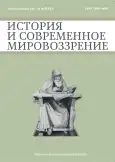The State of Labor Protection at Defense Enterprises in Wartime Conditions (1941-1945)
- Authors: Potemkina M.N.1,2, Zharkynbayeva R.S.3
-
Affiliations:
- Nosov Magnitogorsk State Technical University
- The Russian Presidential Academy of National Economy and Public Administration
- Al-Farabi Kazakh National University
- Issue: Vol 4, No 2 (2022)
- Pages: 39-46
- Section: Articles
- URL: https://bakhtiniada.ru/2658-4654/article/view/147222
- ID: 147222
Cite item
Full Text
Abstract
Full Text
##article.viewOnOriginalSite##About the authors
Marina N. Potemkina
Nosov Magnitogorsk State Technical University; The Russian Presidential Academy of National Economy and Public Administration
Email: mpotemkina@mail.ru
Dr. Sci. (Hist.), Professor; Head of World History Department; Leading Researcher, Center for the Study of Military Economics Magnitogorsk, Russian Federation; Moscow, Russian Federation
Roza S. Zharkynbayeva
Al-Farabi Kazakh National University
Email: roza.zharkynbayeva@gmail.com
Dr. Sci. (Hist.), Professor; Professor Depart-ment of World History, Historiography and Source Studies Almaty, Republic of Kazakhstan
References
- Gribanova E. Evacuation through the eyes of party control // Evacuation: resurrecting the past / Materials of the international. scientific conf. Almaty, 2009. S. 221-242.
- Ivanov E.K., Paletskikh N.P., Usoltseva N.L. Activities of Trade Union Organizations of Industrial Enterprises of the Southern Urals for the Protection of Public Health during the Great Patriotic War // Bulletin of the South Ural State University. Series «Social Sciences and the Humanities «. 2018, vol. 18, no. 1. pp. 24-27.
- Melnikov N.N. Modernization of the tank industry of the USSR in the conditions of the Great Patriotic War. Yekaterinburg, 2017. 416 p.
- Musagalieva A.S. New sources on the contribution of Kazakhstan to the Victory in the Great Patriotic War (on the material of the Akmola region) // Russkii Arkhiv, 2015, Vol. (8), Is. 2.pp. 132-147.
- Nursultanova L.N. Defense industry during the Great Patriotic War // Bulletin of the archive service of Almaty. 2011. №1. pp. 76-83.
- Potemkina M.N., Tokarev E.V. Labor motivation in the South Ural industry: mechanisms and practice of the war period (on the example of the Magnitogorsk Iron and Steel Works in 1941-1945) // Vestnik of the Orenburg State Pedagogical University. Electronic scientific journal. 2020. No. 1 (33). pp. 132-143.
- Sokolov A.K. The drama of the working class and the prospects of working history in modern Russia // Social History. Yearbook. M., 2004. S.7-52.
- Tryakhov I.S. Working conditions at enterprises during the Great Patriotic War (on the materials of the Vladimir region) // Tekhnologos. - 2021. No. 2. P. 30-43.
- Usoltseva N. L. Ensuring the sanitary and epidemic well-being of the Southern Urals during the Great Patriotic War// Magistra Vitae: an electronic journal on historical sciences and archeology. 2016. No. 1. P. 128-136.
- Chilikova E.V. On the issue of the activities of factories and enterprises of the defense industry and the adaptation of workers and engineers evacuated to Kazakhstan // History. Memory. People. / Proceedings of the X International Scientific and Practical Conference. September 23, 2020 Almaty, 2020. 680 p. pp. 81-97.
Supplementary files








